BY LINCOLN ANDERSON | Updated June 23, 5:10 p.m.: On a rainy primary election day that saw a low turnout, Downtowners went to the polls armed with lists of candidates — on their phones, on scraps of paper or in their heads — to do ranked-choice voting.
After the polls closed, Eric Adams appeared to be comfortably in the lead for mayor, with 32 percent of the vote, trailed by Maya Wiley at 22 percent and Kathryn Garcia at 20 percent.
With ranked-choice voting, if no candidate gets more than 50 percent of first-choice votes, then vote counting continues in rounds. At the end of each round, the candidate with the lowest number of votes is eliminated. Ranked-choice voting was put in place to avoid the time and cost of holding runoffs.
Absentee ballots also still need to be counted.
My statement: pic.twitter.com/tKS8vHOJWw
— Senator Brad Hoylman (@bradhoylman) June 23, 2021
The race for Manhattan borough president, meanwhile, looked too close to call, with Mark Levine at 29 percent and Brad Hoylman at 26 percent. Lindsey Boylan, who ran an active campaign and was strongly anti-development, got a bit more than 10 percent. In a post-primary tweet, Hoylman noted it would take a while to learn the final result, but said, “We expect to win.”
If Hoylman loses, he is still a state senator.
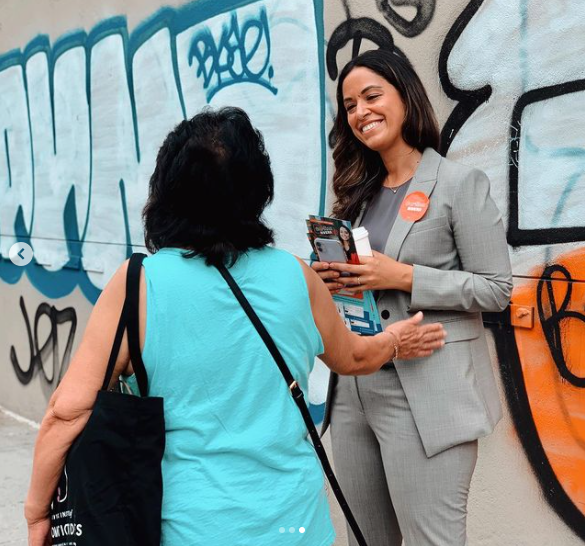
The current borough president, Gale Brewer, a popular political figure in the borough, who is term-limited, won the primary election for her former Upper West Side Council seat.
In the comptroller election, Brad Lander looked like he was in a good position, with 31 percent of the vote, followed by Corey Johnson in second place at 23 percent.
In local City Council races, Carlina Rivera, the incumbent in the East Side’s District 2, won about 73 percent of the vote, while challenger Erin Hussein netted 27 percent.
Lower Manhattan’s District 1 saw Christopher Marte lead the pack. Garnering 40 percent of the votes cast, he was short of the threshold to win outright. But Jenny Low and Gigi Li trailed pretty far behind, with 18 percent and 16 percent of the ballots, respectively, and Marte was expected to win in the ranked-choice process.
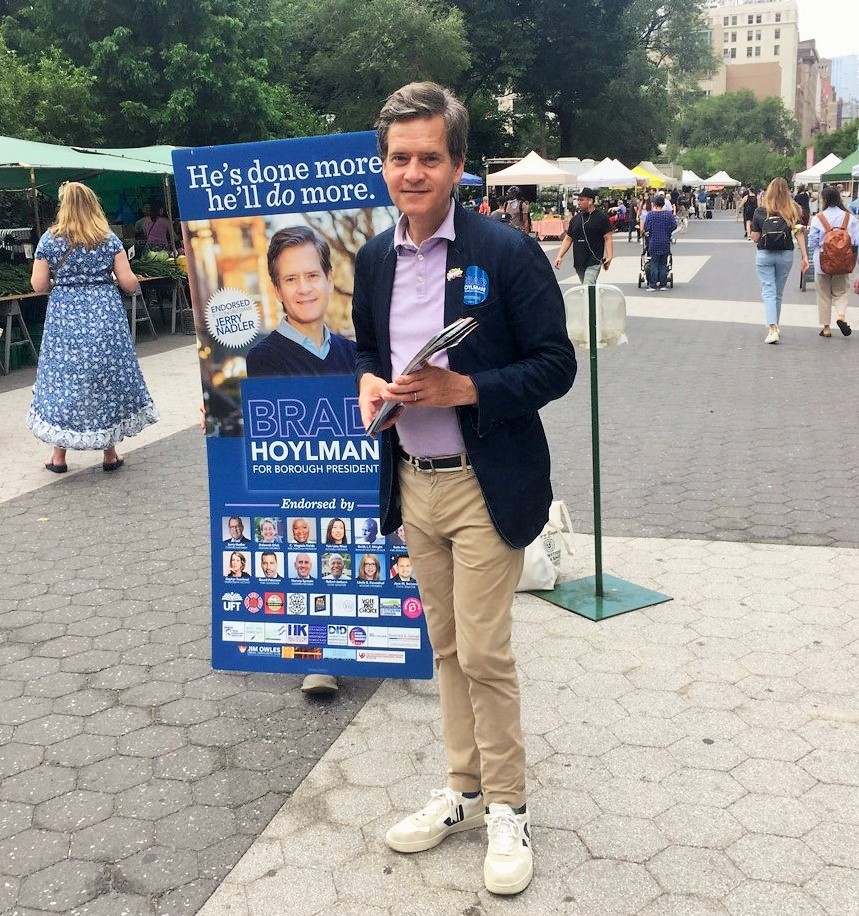
A potential “Yang factor” that was expected to bring Asian candidates to the polls might not have been a factor, after all, or not enough of one to keep Marte from winning.
The young native Lower East Sider had key support form the influential Downtown Independent Democrats political club.
“With a very likely Marte win, this is a victory of unity and diversity over the politics of fear and racial and ethnic division,” said D.I.D. President Richard Corman. “It’s a victory of people over money and power. It’s a victory built by Chris, day by day, year by year, working tirelessly for everyone in this district whose needs are real, but voices unheard.”
Sean Sweeney, a veteran D.I.D. member, hailed it as a historic win for grassroots campaigns. Low, a longtime Chinatown Democratic district leader, had all the political endorsements, including of Congressmembers Jerrold Nadler, Nydia Velazquez, Carolyn Maloney and Grace Meng.
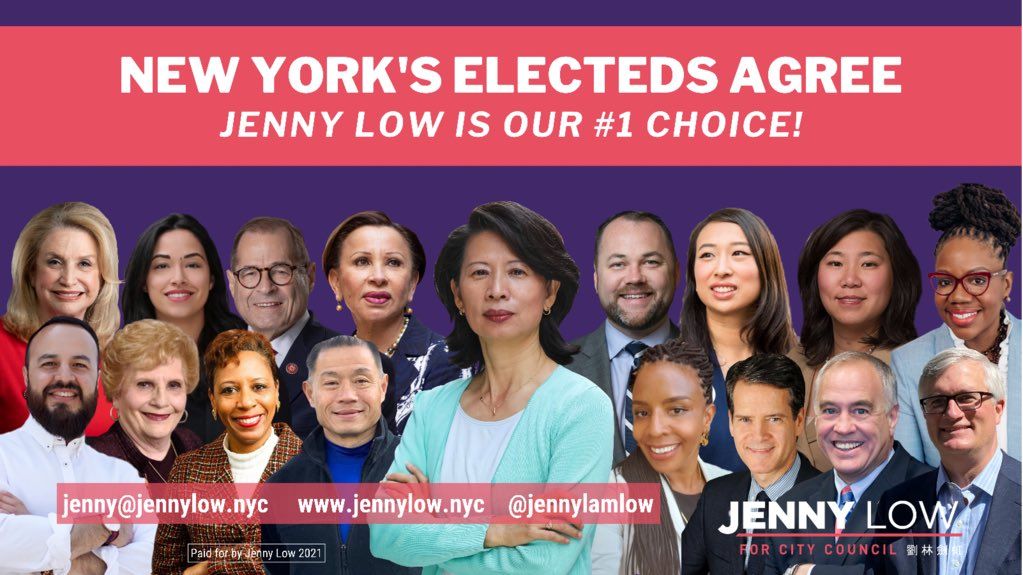
“Marte won handily,” Sweeney crowed. “It shows the grassroots beats the establishment — the grassroots from Soho to the East River to Chinatown, a triangle of community support. The career politicians lost to the people. And the career politicians should take heed: Lower Manhattan is not for sale.”
District 1’s boundaries were set in the 1990s to create an Asian Council seat. The incumbent councilmember, Margaret Chin, who has been in office for three terms and is now term-limited, was the first Asian to hold the seat.
“That district was created to provide a Chinatown candidate,” Sweeney noted. “It has failed.”
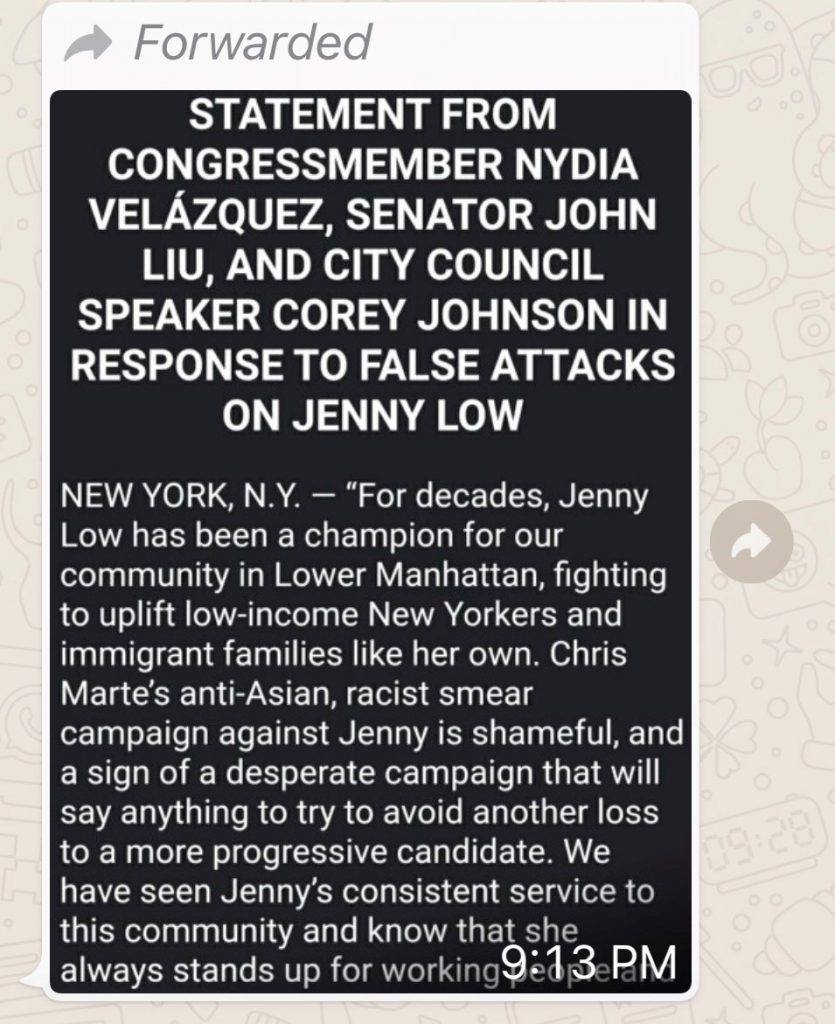
Sweeney was steaming mad, though, about an 11th-hour statement by Velazquez, state Senator John Liu and Speaker Johnson trying to tie Marte to a poster with a caricature of Low by the group Youth Against Sweatshops that branded her a “sweatshop queen”; the statement accused Marte of running an “anti-Asian, racist smear campaign” against Low. The poster refers to the contentious issue of insufficient pay for 24-hour homecare and Low’s tenure as board chairperson at the Chinese-American Planning Council, which provides homecare workers.
“The three politicians who signed onto that vicious smear tweet are all hacks,” Sweeney angrily declared. “We crushed them. We eviscerated them. We emasculated them. Tonight we showed, in Lower Manhattan, it works from the bottom up, not the top down — and there’s a lesson in that.”
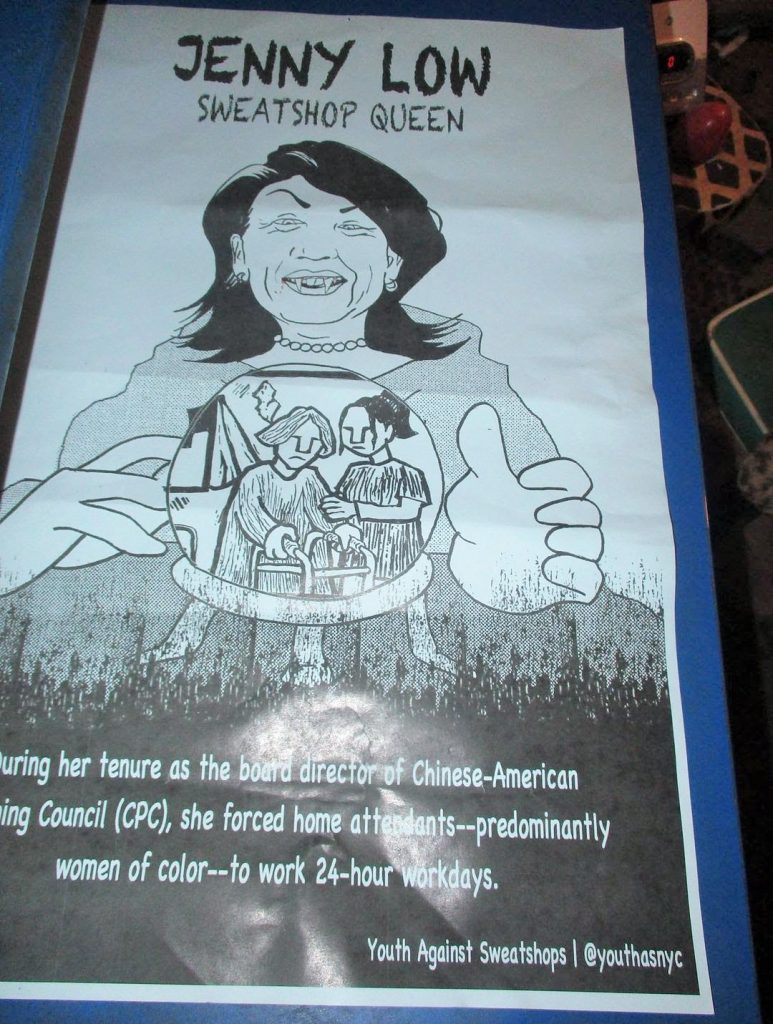
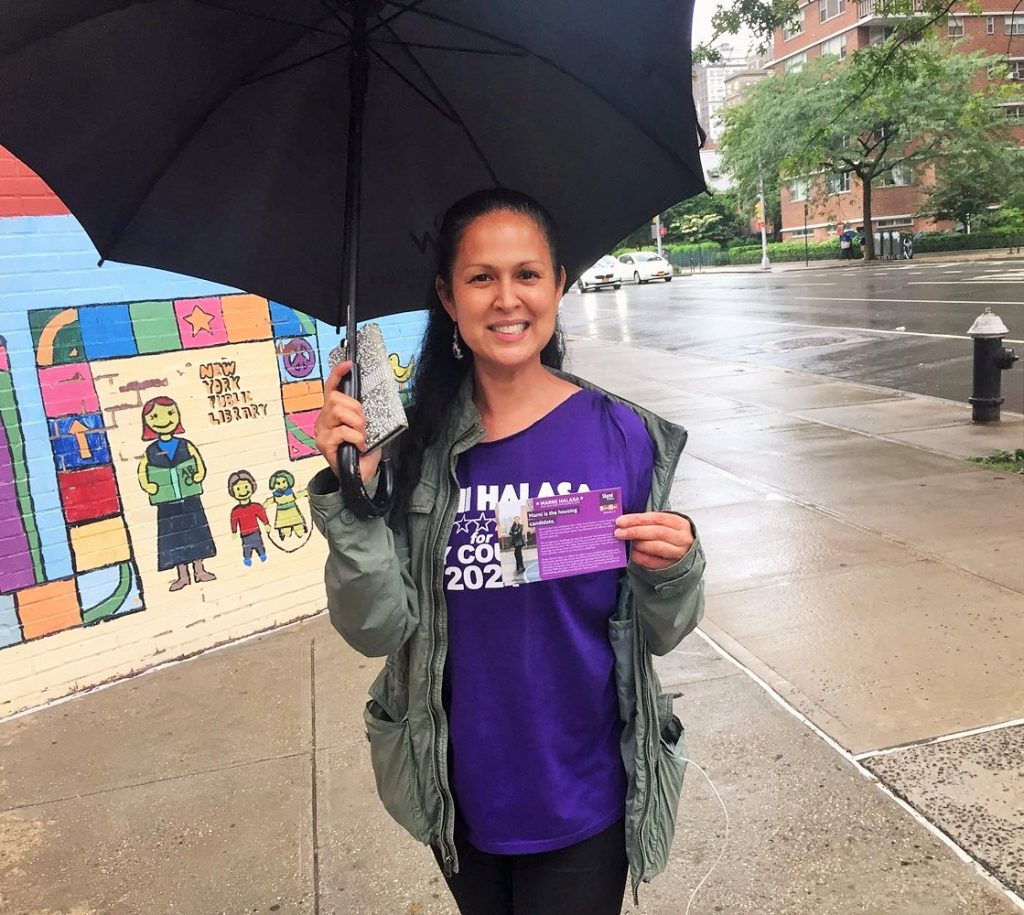
Meanwhile, in Council District 3 (Greenwich Village, Chelsea, Hell’s Kitchen), Erik Bottcher, running against five other candidates, was possibly denied an outright victory on the first ballot, though just barely. He had 47 percent of the vote. Arthur Schwartz was in second place with 15 percent, followed closely by Leslie Boghosian Murphy at 14 percent. Again, absentee ballots still remain to be tallied.
But, speaking late Tuesday night, hours after the polls had closed, Schwartz conceded he sees no path to victory.
“The chances of me catching up to him are almost mathematically impossible,” he said, quickly adding, “they are impossible. “He’s so close that he’ll get it after they take the last person, Phelan [Fitzpatrick], off.”
Schwartz said Bottcher beat him on first-place votes in the Village by about 2 to 1. He also acknowledged Bottcher’s “institutional support” in places like West Village Houses and Penn South, which the candidate built up through years of working with residents, though “without the bravado of Corey.”
Another District 3 candidate, Marni Halasa, an activist and figure-skating instructor at Chelsea Piers’ Sky Rink, said although she didn’t win, she was happy to have helped deny Bottcher, at least on the first round.
“If he doesn’t get 50 percent, it goes to the [next round] — that’s all I want,” Halasa said late on Tuesday. “I am really proud of that 8 percent [that I got] because we were able to stop that. That’s huge. I’m thrilled. The five of us stopped Erik from getting 50 percent, and many of us are unknowns. We stopped the machine,” she said with a joyful laugh.
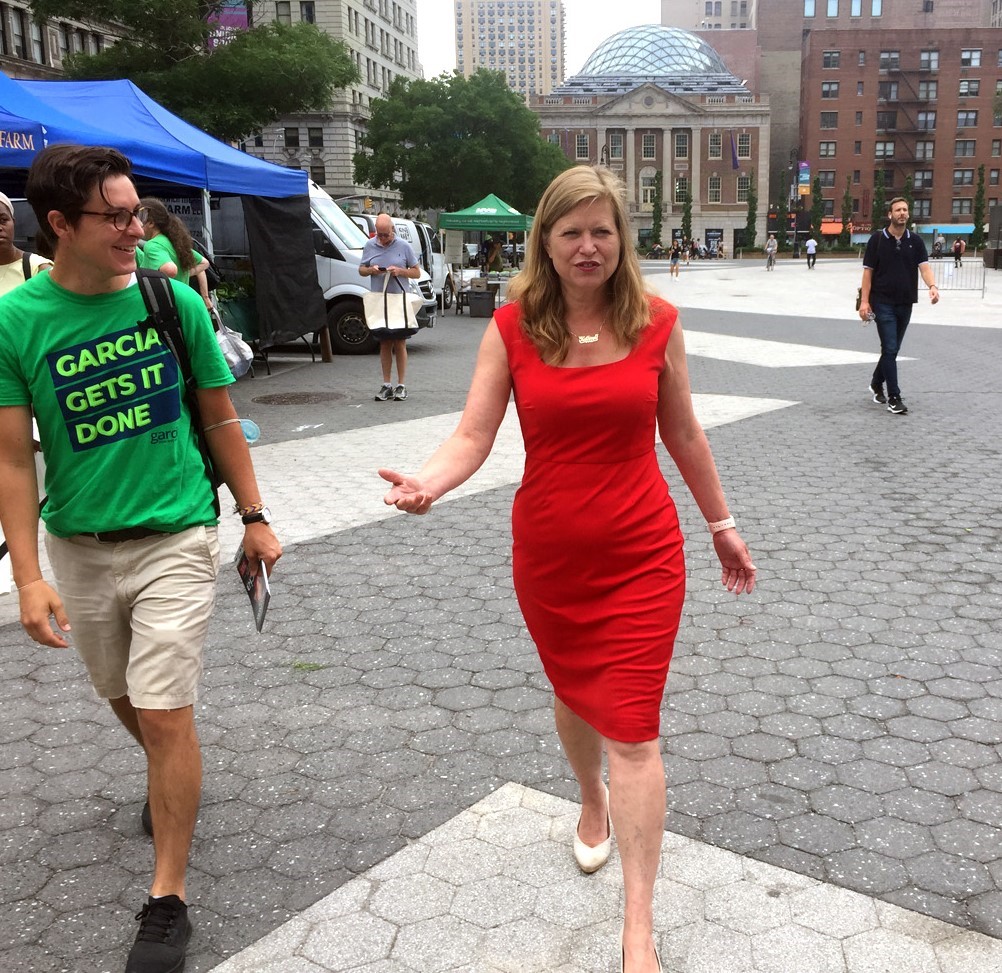
Bottcher now actually will be the councilmember-elect since there is no Republican or third-party challenger in the general election in this race. So there will be nothing listed on the November ballot for District 3.
Due to redistricting, the winners of the City Council elections will only get two-year terms this time around, not the usual four-year terms.
Shortly before 9 p.m., Speaker Johnson came walking down W. 11th St., passing by P.S. 41 on his way to the L.G.B.T. Center to help “close the poll” there and check results.
Asked how he was feeling about his campaign and that of his protégé Bottcher, his former chief of staff, Johnson was upbeat, flashing a huge grin.
“I hope I win!” he said. “I hope Erik wins!”
Johnson entered the comptroller race late, after dropping his bid for mayor. If he loses, he will be the latest in a line of City Council speakers, like Christine Quinn and Gifford Miller before him, who could not make the leap to higher office.
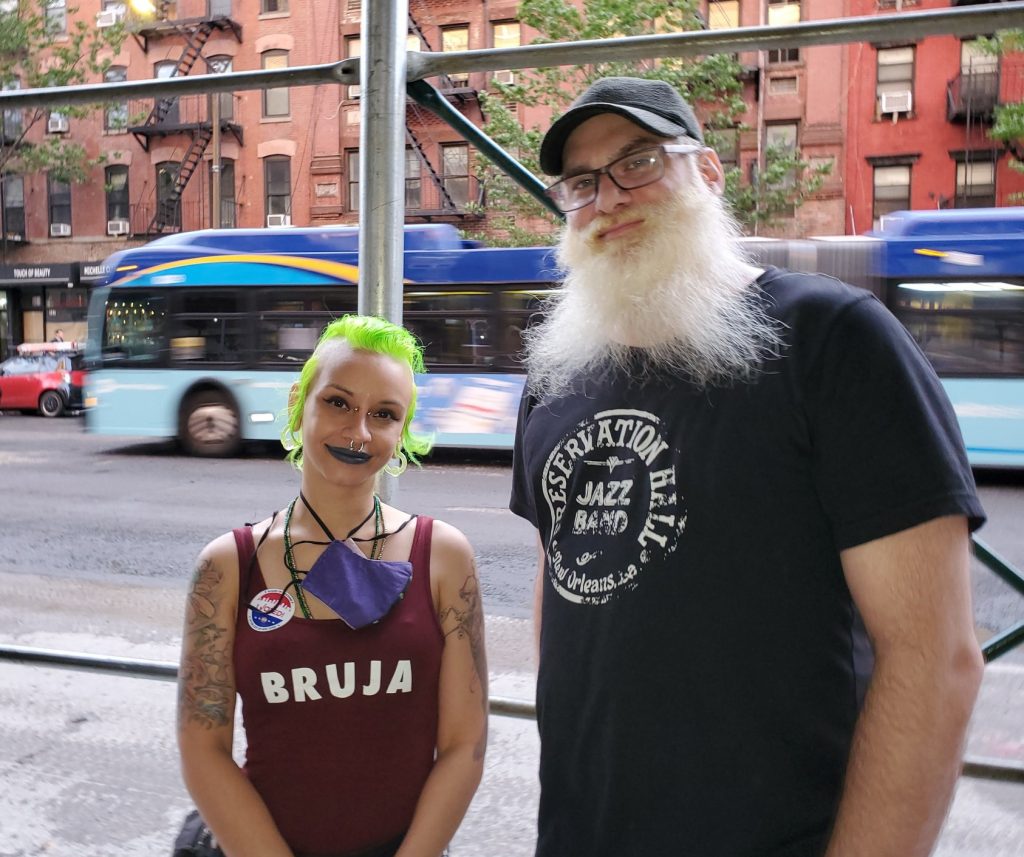
In an election that did not have ranked-choice voting, for Manhattan district attorney, Alvin Bragg led the crowded field with 40 percent of the vote. Tali Weinstein was in second place with 31 percent.
Two D.A. candidates who live in the Village area, Liz Crotty and Eliza Orlins, both got around 4 percent of the ballots cast.
Jumaane Williams cruised to reelection as the city’s public advocate with more than 70 percent of the vote.
Meanwhile, out at the polls on primary election day, voters stopped to talk to The Village Sun about who they voted for, why and what issues influenced their picks.
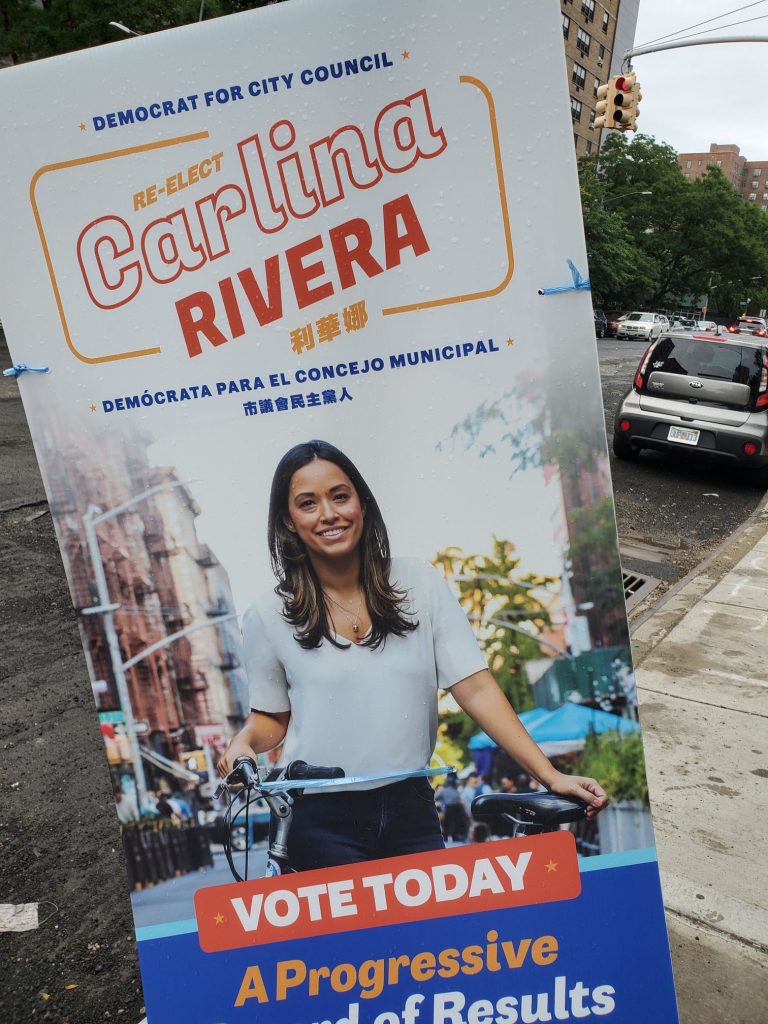
Charlie Gushee had pedaled over on a Citi Bike and was docking it at 12th St. and Avenue C before heading to vote at Village Towers. He said he was backing Rivera. Asked if the fate of East River Park was an issue for him, he said he did not oppose the East Side Coastal Resiliency project, which Rivera supports and which would bury the existing park under 8 feet of landfill.
“I believe it’s painful to lose a park for five years or whatever but the city has to do something,” he said. “And it’s better to look at a hill than a wall.”
Gushee said he believed the E.S.C.R. project would be the best long-term solution for the area’s flood protection. Also, he added that Rivera’s staff had helped his building when he and his neighbors “had a Con Ed issue.”
“Her office was great,” he said. “I was the point person on it.”
A Ninth Precinct police officer in uniform strode into the Village Towers building — not to check the poll site but to vote. He said he could not give his name but had been at the East Village precinct for three years. Because he lives on Staten Island, he was voting by absentee ballot. Asked what his number one issue was this election, he said homelessness.
Asked if he felt he was seeing more homeless people out on the street when he was on patrol, he said, “In my opinion, yes,” adding, “A lot of it has to do with mental health.”
Asked what the answer is — for example, what is the right balance between mental-health outreach workers and police in responding to homeless problems — he shook his head softly with a smile, and said, “That’s above my pay grade,” then hustled off to return to his beat.
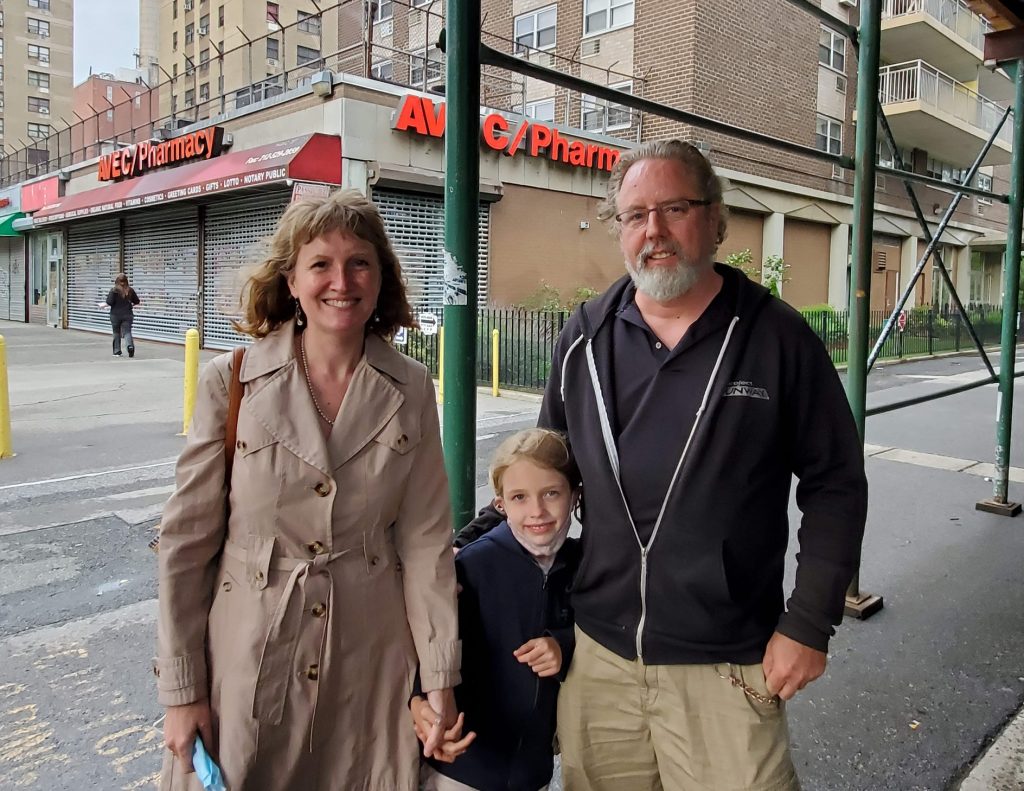
Also heading in to the Village Towers poll on Tuesday afternoon was City Council candidate Allie Ryan. She will be running on her own ballot line, the Neighborhood Party, as an independent in the November general election. She was joined by her husband, Chris Ryan, and one of their daughters, Ruby Lee. Actually, only her husband could vote in the primary since Ryan is registered as an independent.
On the way over they had passed some of Rivera’s life-sized posters featuring her with a bike.
“I have my bike, too,” Ryan shrugged.
While both women are avid cyclists, they don’t see eye to eye on education, which is expected to be a big issue in the race. Ryan said she is eager to debate with Rivera about “zoned schools.”
“We have very different views on education,” she admitted.
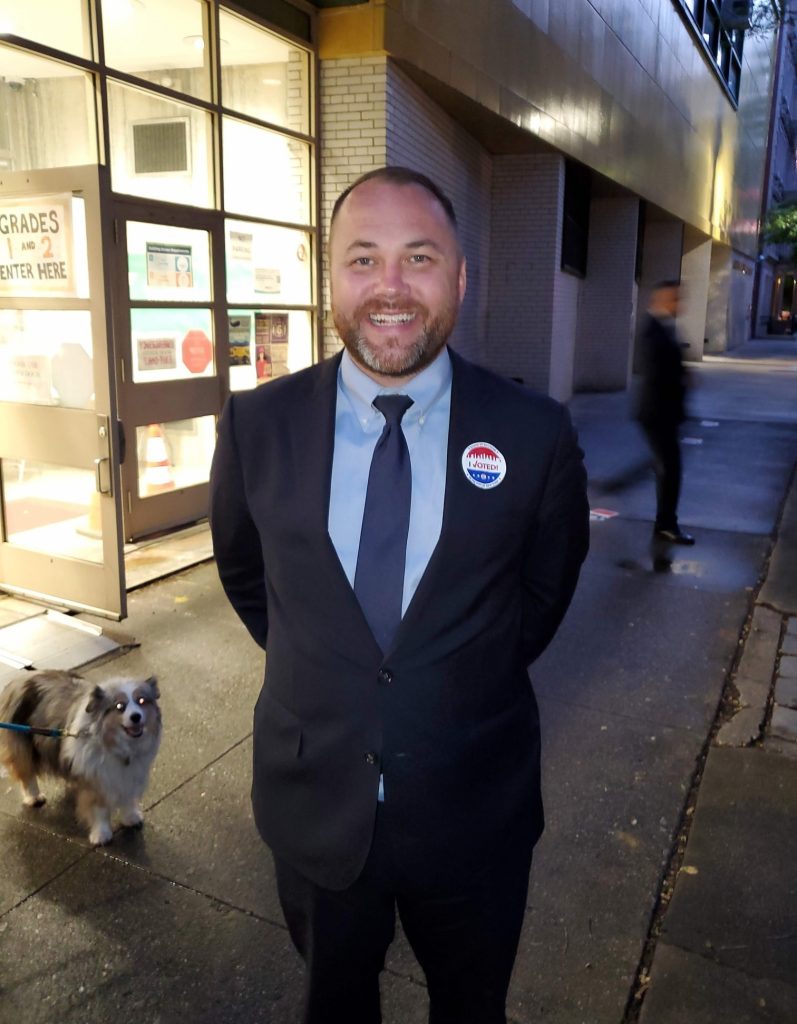
Meanwhile, on the other side of town at P.S. 41 in Greenwich Village, a single mom who gave her name as Ella, when asked who she voted for, pulled out a piece of paper to make sure she would repeat it correctly.
“I have a long list,” he said.
Her top choices were Wiley, Bragg, Hoylman, Lander and Williams.
Because of ranked-choice voting and the fact that there were so many candidates, she and seven longtime friends got together and “crowdsourced” their research, she said.
“It’s eight girlfriends, we’ve known each other since we were undergrads,” she said. “We’re all single parents. I work. We split up the research.”
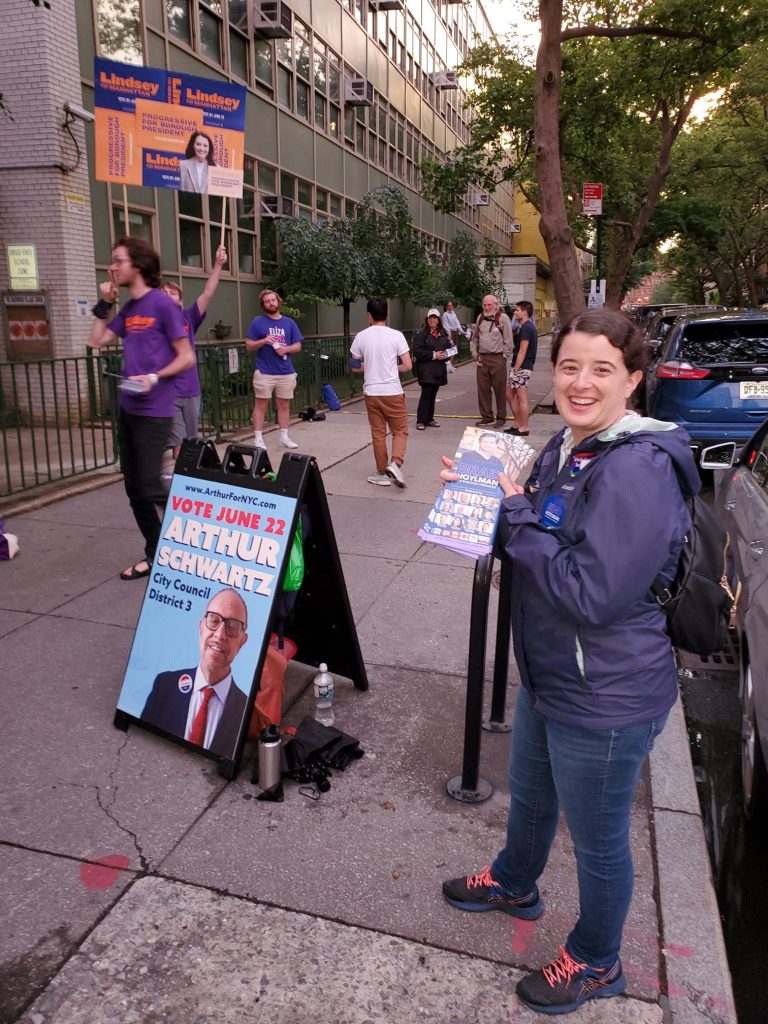
One young woman leaving P.S. 41, who gave her name as Eunice, said she works as a cashier in the neighborhood. She said her top concern was “police reform” and that she voted for Dianne Morales for mayor. Asked how she voted in the other races, she said, “My main thing was mayor.”
Betty, a longtime Villager, shared that she voted for Garcia, Bragg, Hoylman, Williams and Bottcher. However, she admitted she voted blindly in the City Council race and was not familiar with the candidates’ positions.
“I’m ashamed, because it was an uninformed vote,” she said.
In general, she voted for candidates with experience, she said, feeling that this moment, as the city is reemerging from the global pandemic, is too critical for novices.
“I wanted people that were connected,” she said, “who knew the job, no on-the-job training.”
One man, 30, who did not give his name, said he reads The New York Times but felt disappointed that it did not regularly give him more information about the races.
“I’m not that educated of a voter,” he said. “My big issues were some sort of criminal justice reform and climate change. And I started learning more about housing.”
He said he voted for Wiley for mayor, Tali Weinstein for district attorney, Ben Kallos for borough president and Schwartz for City Council.
“He just seems like a guy who’s been here a long time,” he said of why he darkened the oval for Schwartz. “He’s worked through a lot of things.”
Another man who did not give his name, who looked to be in his 30s or 40s, said he voted for Bragg for D.A.
“That was the race I was most interested in,” he said. “I’m not a fan of Tali.” As for the other contests, he said, “Honestly, I was just checking a bunch of people that weren’t Yang or Adams. Yang is a bit of a fraud — well, a fraud. And Adams is still a cop.”
As for the City Council election, he said he voted for Bottcher not Schwartz. He explained that he is a political consultant and had some dealings with Schwartz in the past but did not elaborate.
A young lawyer, 27, could not give his name for business reasons. His top three votes for mayor were Garcia, Wiley and Yang. Garcia, he said, has the right “blend of progressive and competence.”
He was the night’s final voter at the poll site.

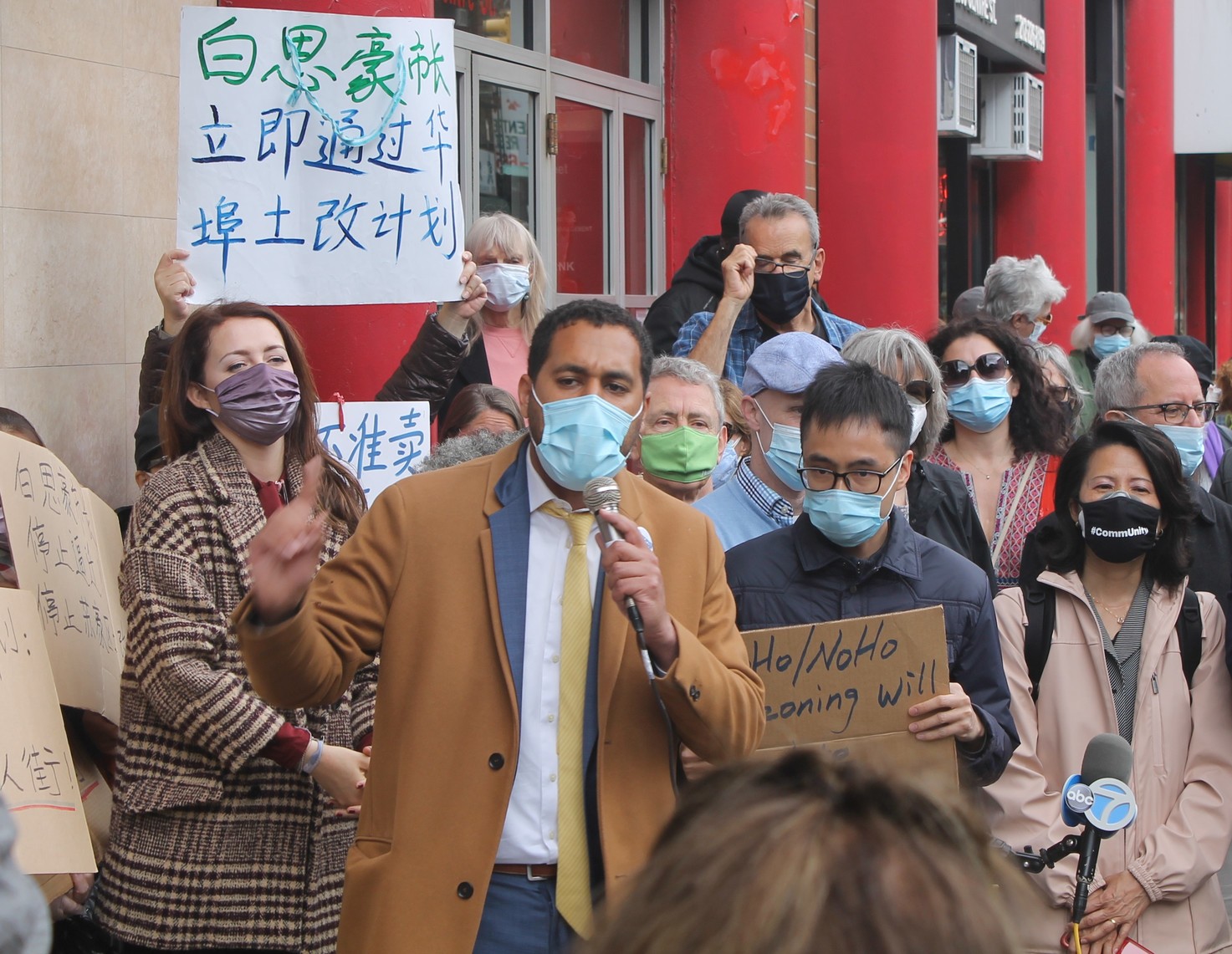
Let us also pray for District 2 and another 4 years of CCM Rivera. We needed new leadership–someone who would listen to her constituents regarding the destruction of the East River Park and the debacle of affordable housing, which is a gift to real estate developers.
Amen.
Let us pray for CB2 and CB3. The downward spiral in leadership looks to continue and our precious neighborhoods and communities doomed to further degradation by special interests, well-funded real estate and narrowly focused bus lane and bike lane transportation advocates to the detriment of all other longtime residents invested in the community.
Unforced error.
Should read CD 2 and CD 3.